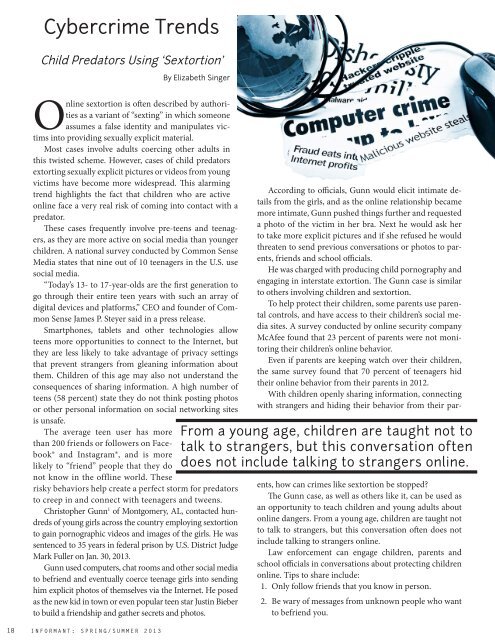Informant Vol 10 No 2 - 2013 Spring - National White Collar Crime ...
Informant Vol 10 No 2 - 2013 Spring - National White Collar Crime ...
Informant Vol 10 No 2 - 2013 Spring - National White Collar Crime ...
You also want an ePaper? Increase the reach of your titles
YUMPU automatically turns print PDFs into web optimized ePapers that Google loves.
Cybercrime TrendsChild Predators Using ‘Sextortion’By Elizabeth SingerOnline sextortion is often described by authoritiesas a variant of “sexting” in which someoneassumes a false identity and manipulates victimsinto providing sexually explicit material.Most cases involve adults coercing other adults inthis twisted scheme. However, cases of child predatorsextorting sexually explicit pictures or videos from youngvictims have become more widespread. This alarmingtrend highlights the fact that children who are activeonline face a very real risk of coming into contact with apredator.These cases frequently involve pre-teens and teenagers,as they are more active on social media than youngerchildren. A national survey conducted by Common SenseMedia states that nine out of <strong>10</strong> teenagers in the U.S. usesocial media.“Today’s 13- to 17-year-olds are the first generation togo through their entire teen years with such an array ofdigital devices and platforms,” CEO and founder of CommonSense James P. Steyer said in a press release.Smartphones, tablets and other technologies allowteens more opportunities to connect to the Internet, butthey are less likely to take advantage of privacy settingsthat prevent strangers from gleaning information aboutthem. Children of this age may also not understand theconsequences of sharing information. A high number ofteens (58 percent) state they do not think posting photosor other personal information on social networking sitesis unsafe.The average teen user has morethan 200 friends or followers on Facebook®and Instagram®, and is morelikely to “friend” people that they donot know in the offline world. Theserisky behaviors help create a perfect storm for predatorsto creep in and connect with teenagers and tweens.Christopher Gunn 1 of Montgomery, AL, contacted hundredsof young girls across the country employing sextortionto gain pornographic videos and images of the girls. He wassentenced to 35 years in federal prison by U.S. District JudgeMark Fuller on Jan. 30, <strong>2013</strong>.Gunn used computers, chat rooms and other social mediato befriend and eventually coerce teenage girls into sendinghim explicit photos of themselves via the Internet. He posedas the new kid in town or even popular teen star Justin Bieberto build a friendship and gather secrets and photos.From a young age, children are taught not totalk to strangers, but this conversation oftendoes not include talking to strangers online.According to officials, Gunn would elicit intimate detailsfrom the girls, and as the online relationship becamemore intimate, Gunn pushed things further and requesteda photo of the victim in her bra. Next he would ask herto take more explicit pictures and if she refused he wouldthreaten to send previous conversations or photos to parents,friends and school officials.He was charged with producing child pornography andengaging in interstate extortion. The Gunn case is similarto others involving children and sextortion.To help protect their children, some parents use parentalcontrols, and have access to their children’s social mediasites. A survey conducted by online security companyMcAfee found that 23 percent of parents were not monitoringtheir children’s online behavior.Even if parents are keeping watch over their children,the same survey found that 70 percent of teenagers hidtheir online behavior from their parents in 2012.With children openly sharing information, connectingwith strangers and hiding their behavior from their parents,how can crimes like sextortion be stopped?The Gunn case, as well as others like it, can be used asan opportunity to teach children and young adults aboutonline dangers. From a young age, children are taught notto talk to strangers, but this conversation often does notinclude talking to strangers online.Law enforcement can engage children, parents andschool officials in conversations about protecting childrenonline. Tips to share include:1. Only follow friends that you know in person.2. Be wary of messages from unknown people who wantto befriend you.18INFORMANT: SPRING/SUMMER <strong>2013</strong>
















